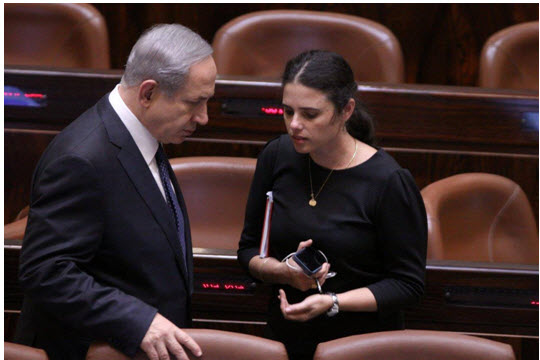A new undemocratic “anti-terrorism” bill that would greatly expand the state’s powers and redefine what constitutes a terror organization and terrorist activity was advanced to its final stages in the Knesset on Monday, May 30. By a vote of 10-2, the Knesset Constitution, Law and Justice Committee approved the bill for its second and third readings in the Knesset plenum. The committee had previously met for 30 sessions, during which it rejecting all 150 objections to the bill submitted by the Joint List and Meretz. If passed after the third reading, the bill will become law.
Justice Minister Ayelet Shaked is promoting the bill, at the urging of the Shin Bet security service and the defense establishment. Two opposition parties, Zionist Union and Yesh Atid, have already committed to supporting the bill when it reaches Knesset floor in a few weeks.
The new law would impose stricter sentences for “terrorist activities and their assistance.” It also defines new types of terrorist activity – such as expressing identification with a terrorist organization, incitement to commit terror, and non-prevention of acts of terror. The new law would include various measures that were previously part of the British Mandate Emergency Measures Act (1945). These include administrative detention and travel restrictions forbidding people from leaving the country. These rules, originally from the British Mandate in Palestine, are still on the books in the State of Israel.
The bill proposes that a detainee can be held for 48 hours before being brought before a judge or seeing an attorney. The law will also permit the security service to conduct computer surveillance of anyone suspected of involvement in terrorist activity, subject to approval by the prime minister. The law also proposes confiscating money and property of persons and organizations suspected of terror-related violations. The law will apply only within Israel, not the Occupied Palestinian Territories under Israeli military rule.
Knesset members from Hadash voiced opposition to the proposed extreme-right legislation. “We are presented with a useless and even dangerous new stringency,” MK Dov Khenin (Hadash – Joint List) said during a Knesset plenum debate last November. “Relinquishing the principle of preponderance [i.e., evidence that attacks could possibly result from the alleged incitement – Editor] is the true ploy of the bill. The simple act of speaking, even if it’s clear that it won’t lead to violence, becomes a crime. Instead of making the police and legal authorities focus on expression that poses a real threat, we’re turning all expression into criminal expression and raising the severity of punishment to an extreme,” Khenin charged.
MK Youssef Jabareen (Hadash – Joint List) lamented that “the government is eating away at the democratic principles that we have been accustomed to until now. This proposal violates the historic balance between criminal law and freedom of expression and the damage the state wishes to prevent. I am concerned about this law being used inappropriately.”
Adalah, the Legal Center for the Arab Minority in Israel, commented that “the law substantially strengthens and broadens the powers of the police and the General Security Services (“Shin Bet” or “Shabak”) to suppress any legitimate protest activities against Israeli policies. It also legitimizes the use of “secret evidence” in order to take preventative measures against these activities, thereby impeding the possibility of objecting before the judiciary to such repressive measures.” Adalah emphasized that if the new “Anti-Terrorism Law” passes, it would “seriously escalate the level of repression and intimidation targeted against the political activity of Arab-Palestinian citizens of Israel through the criminalization of political, cultural and social relationships between them and the rest of the Palestinian people.”
Related:
- Knesset Passes Controversial, Fascistic “Counterterrorism Bill”
- Knesset Moves Forward Stricter Bill against “Incitement of Terrorism”



